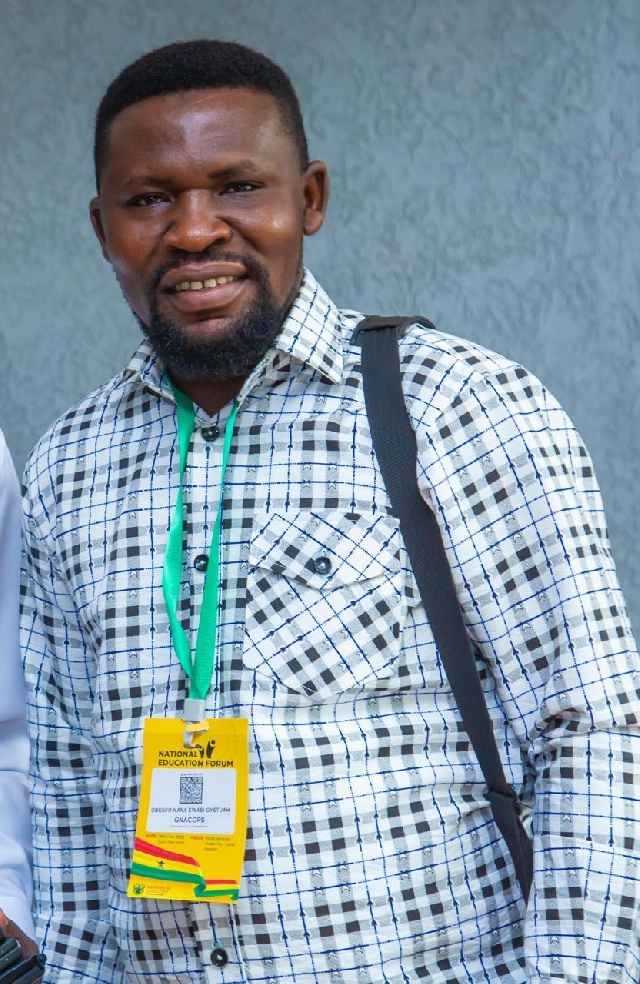Transforming education in Ghana: A new definition
 Obenfo Nana Kwasi Gyetuah
Obenfo Nana Kwasi Gyetuah
The recently concluded National Level Education Forum in Ho marked a significant turning point in Ghana's education landscape. As a key stakeholder at the event, I posed a thought-provoking question to the audience: "Is the future of education about changing systems, or is it about changing our attitude to accept a new definition of education?"
This question struck at the heart of our current education system, which has been criticized for prioritizing theoretical knowledge over practical skills. As I emphasized during the forum, the future of education is not about tweaking existing systems, but about fundamentally transforming our understanding of what education means.
Challenging Traditional Notions
For too long, we have adhered to a narrow definition of education, one that emphasizes academic achievement above all else. However, this approach has failed to equip students with the practical skills and innovative thinking required to succeed in today's fast-paced, globalized world.
As I asked the other stakeholders, "What is education, really?"
Is it merely a means of imparting knowledge, or is it a process of empowerment, one that enables individuals to think critically, solve problems creatively, and adapt to an ever-changing environment?
A New Definition of Education
The answer, I proposed, lies in embracing a new definition of education, one that prioritizes practical skills, innovation, and creativity. This requires a fundamental shift in our attitude, one that recognizes the value of hands-on learning, vocational training, and community engagement.
As I emphasized, "Education should not be limited to theoretical knowledge from books. We need to develop practical skills and innovative solutions to address our unique challenges and opportunities."
The future of education in Ghana is not just about changing systems, but about changing our attitude to accept a new definition of education. To achieve a transformational education agenda for a sustainable future, we must redefine education to reflect our unique challenges and values.
A Standalone TVET Curriculum
A crucial starting point for crafting this new definition is the introduction of a standalone Technical and Vocational Education and Training (TVET) curriculum, starting from kindergarten to university. This will provide students with practical skills and innovative solutions to address Ghana's challenges, such as unemployment, over-reliance on foreign goods, and healthcare.
The National TVET Qualifications Framework (NTVETQF) already provides a structured approach to TVET education, with eight levels of certification, from National Proficiency I to Doctor of Technology. However, we need to take it a step further by integrating TVET into the mainstream education system, making it a viable alternative to traditional academic programs.
Abolishing Rigidity in Academic Assessments
Another critical aspect of redefining education in Ghana is the abolition of rigidity and fixation of academic assessments by the West African Examinations Council (WAEC). We need to move towards more dynamic assessment forms that prioritize practical skills and innovative solutions.
This will require a shift from the traditional emphasis on theoretical knowledge to a more holistic approach that assesses students' ability to apply what they have learned. By doing so, we can equip students with the skills and competencies needed to succeed in the job market and drive innovation and progress.
A Local Language-Based Education System
A crucial component of this new definition is the introduction of a local language-based education system, where our local languages are used as languages of instruction in our schools. This will enable people with practical skills experience to participate in educational development in Ghana, and provide students with a stronger foundation in their mother tongue.
From Academic Freedom to Education Freedom
Finally, we need to expunge the mantra of promoting academic freedom and instead focus on total education freedom. This means providing students with the autonomy to choose their own learning pathways, whether it's through TVET programs or traditional academic programs.
Education freedom is about empowering students to take ownership of their learning, to explore their passions and interests, and to develop the skills and competencies needed to succeed in Ghana.
A Call to Action
The National Level Education Forum marked a crucial step towards rethinking education in Ghana. However, the journey ahead requires collective action and commitment. As educators, policymakers, and stakeholders, we must work together to create an education system that is relevant, effective, and empowering.
As I concluded, The future of education is not about changing systems; it's about changing our attitude. Let us embark on this journey together, with an open mind, a willingness to innovate, and a commitment to creating a brighter future for all Ghanaians.
By Obenfo Nana Kwasi Gyetuah





